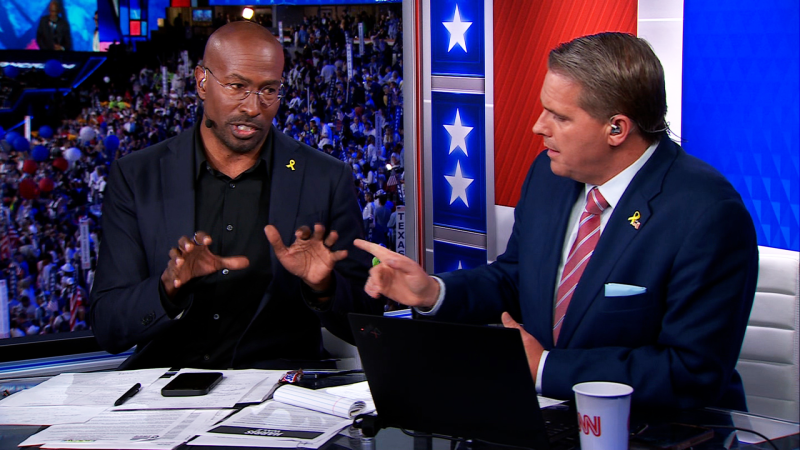Van Jones praised Vice President Kamala Harris’ acceptance speech at the Democratic National Convention, calling her delivery powerful and impressive. He highlighted her ability to deliver a message that was both personal and empathetic, connecting with the American people on a deeper level. Jones commended Harris for effectively highlighting the themes of unity, empathy, and leadership in her speech, noting that she did an excellent job of humanizing herself and conveying her passion for serving the country.
Scott Jennings, on the other hand, criticized Harris’ speech, labeling it as uninspiring and lacking in substance. He contended that her speech did not address the core issues facing the country or provide a clear vision for the future. Jennings suggested that Harris focused more on attacking President Donald Trump than presenting her own policies and plans, which he believed was a missed opportunity for her to connect with voters. He also noted that her delivery seemed rehearsed and lacked the authenticity needed to resonate with the American people.
Jones disputed Jennings’ criticisms of Harris’ speech, arguing that she effectively highlighted the stark differences between the Democratic and Republican tickets and provided a vision for a more inclusive and united America. He praised Harris for her authenticity and ability to connect with voters on a personal level, noting that her speech resonated with many Americans who have felt marginalized or ignored in the current political climate. Jones emphasized the importance of Harris’ historic nomination as the first Black and South Asian woman on a major party ticket, calling it a significant moment for the country.
Jennings reiterated his view that Harris’ speech was lacking in substance and failed to outline concrete policies or plans for addressing the key issues facing the country. He argued that her attacks on President Trump were predictable and did not offer anything new or compelling to voters. Jennings also criticized Harris for not effectively addressing the violence and unrest in some American cities, suggesting that her speech did not provide a clear solution to these issues. He emphasized the importance of focusing on policies that would improve the lives of all Americans, rather than resorting to partisan attacks.
Jones pushed back against Jennings’ assertions, highlighting Harris’ track record as a senator and her commitment to addressing systemic racism, healthcare, and economic inequality. He defended her speech as a necessary critique of the current administration’s failures and a call to action for a more just and equitable society. Jones noted that Harris’ personal story and experiences as a woman of color resonated with many Americans who have faced similar challenges and hardships. He praised her for her courage and determination in breaking barriers and fighting for a better future for all Americans.
In conclusion, Van Jones and Scott Jennings offered differing perspectives on Vice President Kamala Harris’ acceptance speech at the Democratic National Convention. Jones praised Harris for her powerful delivery, empathy, and ability to connect with voters on a personal level. He highlighted her historic nomination and the importance of her message of unity and leadership. Jennings, on the other hand, criticized Harris’ speech for lacking substance and failing to outline clear policies for addressing the key issues facing the country. He argued that her attacks on President Trump were predictable and did not offer anything new to voters. Ultimately, the debate between Jones and Jennings encapsulated the broader divide in American politics and the different visions for the future of the country.


